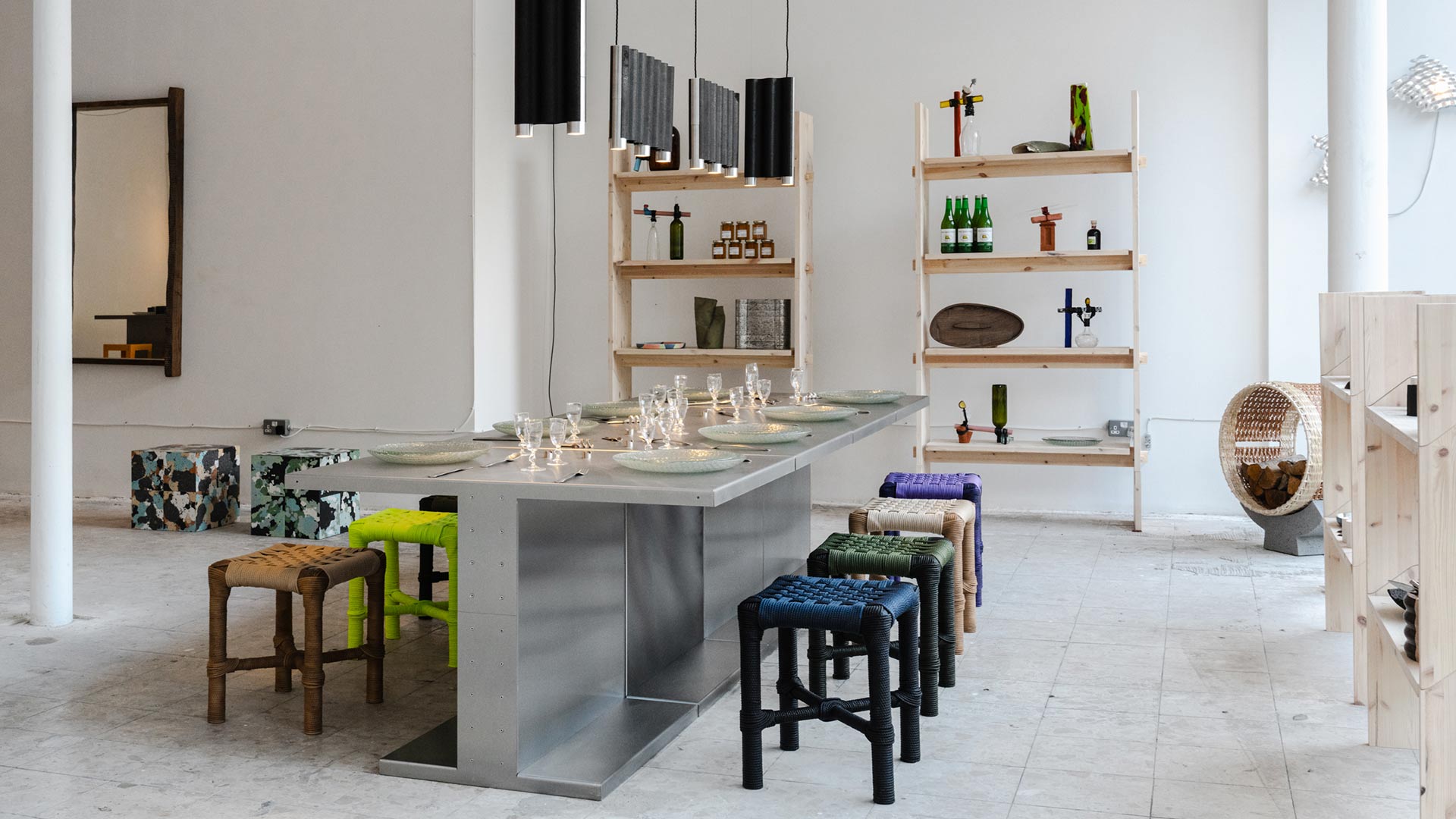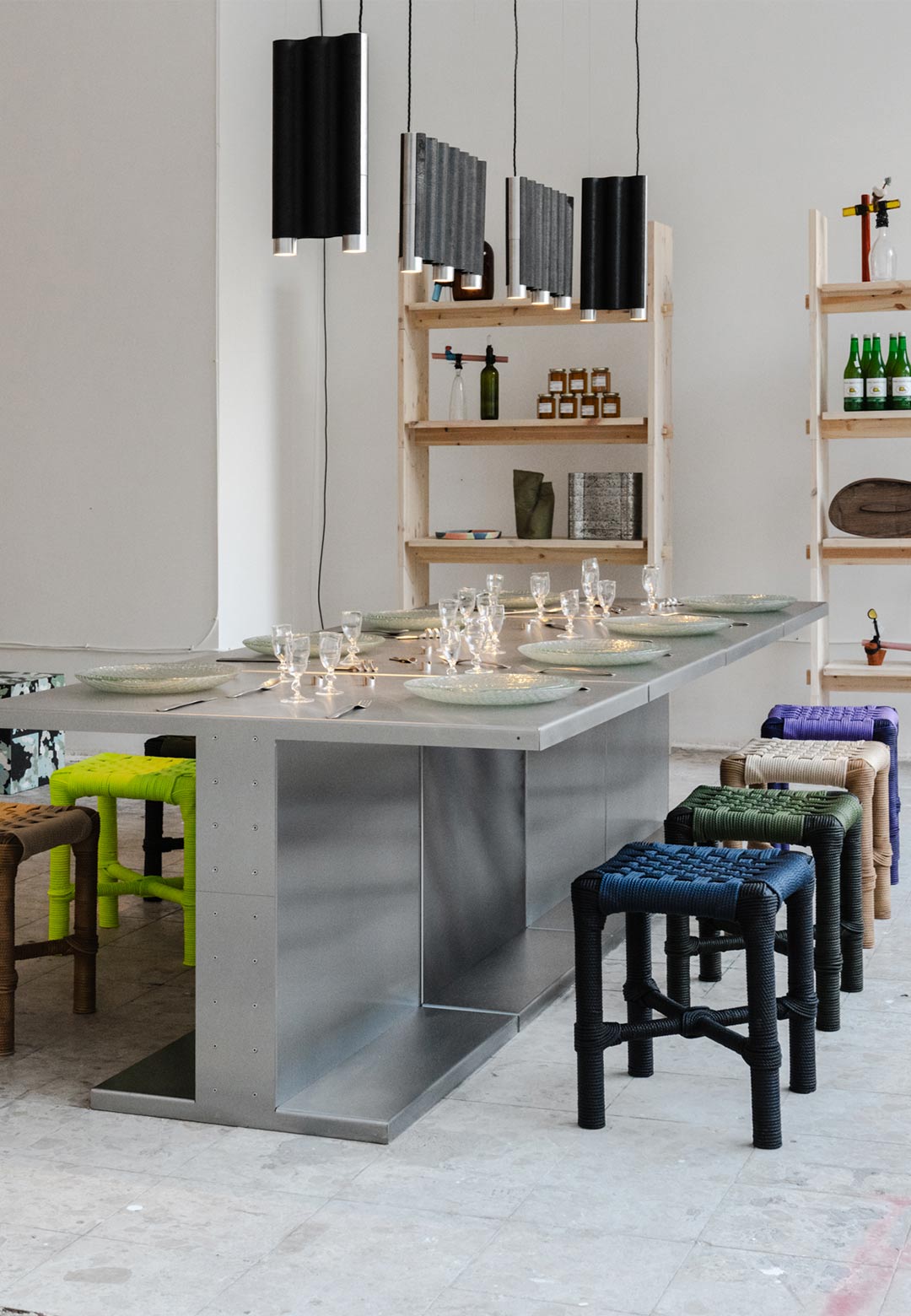Practising the power and impact of community and nature-infused conviviality in design, The Farm Shop is a curatorial project congregating designers, architects, and artists to produce a playful, hands-on, and educational experience drawing from the resources, knowledge, and practices centred around the Grymsdyke Farm in rural Buckinghamshire, UK. Set up by Dr Guan Lee, the faceted farm performs as a research facility, fabrication workshop, and a living-working space, with a sustained and geared interest in the “essential connections between processes of design, making and situations. Through its communal and collaborative approach, this is a place where people can exchange ideas, working methods, and expertise,” Lee explains.
The Farm Shop, the protagonist of Grymsdyke Farm, is devised as a communal space which facilitates fresh knowledge about design productions, as “a vehicle for exploring modes of production that are rooted in vernacular design knowledge, visual language, and materials,” states the press release shared by the project’s curators.
“At Grymsdyke Farm, I set out to create a communal workshop and almost 20 years later, I came to realise that our community is influenced by how we make and what we make. For ‘The Farm Shop,’ we wanted to share that sense of community by bringing together an exciting group of designers to create a collection that expresses our relationships to the farm,” Lee adds, who conceived and co-curated the project with Italian designer Marco Campardo and Luca Lo Pinto, artistic director of MACRO (Museum of Contemporary Art of Rome).
The Farm Shop, which made its poignant presence known at the London Design Festival 2023 (situated in the Brompton Design District), revelled at the joyful juxtaposition of art and design by conceiving a ‘total design space’ where visitors participated in a series of knowledge-garnering experiences. Presented by Fels (a platform dedicated to showcasing unique artworks, hybrid objects and contemporary furniture), the design exhibition which took place from September 16 – October 15, 2023, presented efficacious projects decorating a space devised by the 18 participating contemporary designers, artists, and makers themselves. They were encouraged to partake in a residency on the farm, using its facilities to create one element of a homeware and dining collection.
The collective and collaborative project displayed product designs that emerged from an exercise of engaging directly with the farm’s local community, manufacturing skills, and material palette. “Thinking about the relationship of people and the spaces they live in, the invited designers examine(d) how setting and community inform design, and how it connects us to the people and places around us. With their work created for The Farm Shop, they seek to explore where the things around us come from, and how we can care for them,” they continue.
At the now-concluded design festival in London, The Farm Shop showcased spirited furniture designs and allied functional objects that referenced nature and the communal spirit: from field to workshop, Campardo fashioned the ‘Walnut’ bench and a coinciding console unit from a felled walnut tree on the farm’s grounds, preserving the tree’s legacy while ‘celebrating Grymsdyke Farm’s natural material identity’; Andu Masebo crafted a series of floor lamps, materialising his fascination with Grymsdyke’s natural surroundings, and its machine-filled workshops; everyday goods crafted by Nathalie Bagnoud ensured no cloth was wasted, as she utilised the local material community to create a sustainable design collection of unisex linen aprons, dyeing the fabric with plants at the farm and coating it with beeswax from local hives.
Creatives Nicola Pecoraro, Daniel Dewar & Grégory Gicquel, and Laëtitia Badaut Haussmann’s endeavours employed food as their primary vehicle “for exploring the conviviality and community of Grymsdyke Farm. Animating The Farm Shop, the happenings blur(red) the boundaries of art and utility,” the creators elaborate. Other participating product designers and artists included EJR Barnes, Sammi Cherryman, Miranda Keyes, Jessie Lee, Studio Thus That, Lorenzo Vitturi, Jamie Wolfond, and more.
For Fels, The Farm Shop remains unique in its approach, intent, and scale. In their words: “The project is ambitious and playful and involves so many designers, studios, and curators we admire. The whole ethos of the project works so nicely with Brompton Design District’s theme of ‘Conviviality - The Art of Living,’ and having an entire collection designed with such a rich narrative at its core is something we (were) very excited to show in the festival’s leading district.”
Lee teaches at the Royal College of Art and is an Associate Professor of Architecture and co-founder of the Material Architecture Lab at the Bartlett School of Architecture, UCL. With a practice exploring the essential connections between processes of design, making and place, the director of Grymsdyke Farm spoke to STIR about The Farm Shop’s ethos, recalling the overarching impact of collaboration and nature-inspired objects showcased during the design event this year.
Jincy Iype: What articulates the core concept and inspiration behind The Farm Shop, which you established in 2004?
Guan Lee: A farm shop, often directly linked to the farm where produce is grown or livestock reared, plays a pivotal role in the local community and the agricultural sector. 'The Farm Shop' takes this concept and applies it within a global design context. The bond between culture and agriculture is profound. For us, design and manufacturing derive from the symbiotic relationship between the land and its local community. The term 'The Farm Shop' is vital—it is not merely a farm shop—it nurtures design and fosters relationships between people, objects, and locations. In this sense, the title is specific, yet its overarching concept remains universal. For this exhibition, the 'Farm' references the Grymsdyke Farm, making it site-specific.
Jincy: What forms the underlying ethos and workings of the Grymsdyke Farm?
Guan: At Grymsdyke Farm, the relationship between material experimentation and design, as well as between working and living, is intimate. This intimacy is qualitative in essence and refers to the bond between materials, the processes of making, the environment, and the interplay of everyday life and work.
This farm provides an opportunity to engage directly with a range of materials and making techniques, from traditional craftsmanship to digital contemporary design methodologies. This includes woodworking, metalworking, ceramics, and digital fabrication. Historically a working farm, its secluded setting offers a unique place for reflection, experimentation, and production.
Jincy: Please take us behind your curatorial approach for the collaborative project.
Guan: We aren't a typical farm shop in terms of offerings, but our ethos remains centred on freshness, groundedness, and lightness. In essence, designers were prompted to create something novel or reimagine an existing design, collaborating closely with the community and aligning with the farm's production capabilities. They were also urged to be conscious of overproduction and to prioritise care and environmental considerations.
Collectively, we have strived to challenge one another from the workshop to the farm shop, throughout the summer of 2023.
Jincy: In its participation, how did The Farm Shop fit into Brompton Design District’s theme of ‘Conviviality - The Art of Living,’ and the larger landscape of LDF 2023?
Guan: Living and working together at the farm isn't merely a concept or aspiration—it is our reality. However, Brompton’s apt theme allowed us to reflect on our working relationships evolving into friendships, and the importance of respect. The entire Farm Shop collection is showcased as a unified environment, drawing references from domestic, everyday life, where each designer contributed to shaping this environment.
Jincy: How did The Farm Shop and its showcased designs explore “what we consume and how we consume”?
Guan: Buying fresh produce from a farm shop differs from purchasing the same produce from a supermarket. We believe that when consumers contemplate buying homeware items such as a lamp or table, they should apply the same rationale as they would at a farmer’s market or local farm shop. By offering everyday household items at our Farm Shop, we want the public to view design as essential, practical, and as durable as any mass-produced product. Additionally, the premium supports the local economy and the sustainability of crafts.
Jincy: What is NEXT for you?
Guan: We would like to explore the idea of The Farm Shop further—like any farming project, its workability needs to be tested over time, over many seasons, and with many more designers at the Grymsdyke Farm.
London Design Festival is back! In its 21st edition, the faceted fair adorns London with installations, exhibitions, and talks from major design districts including Shoreditch Design Triangle, Greenwich Peninsula, Brompton, Design London, Clerkenwell Design Trail, Mayfair, Bankside, King's Cross, and more. Click here to explore STIR’s highlights from the London Design Festival 2023.
- Art and Design
- Contemporary Design
- Craftsmanship
- Design Event
- Design Exhibition
- Design Fair
- Design Festival
- Floor Lamp
- Furniture Design
- Furniture Designer
- Lamp Design
- Lighting Design
- London
- London Design Festival
- London Design Festival 2023
- Marco Campardo
- Product Design
- Product Designer
- Sustainability
- Sustainable Design
- United Kingdom






 Sign in with email
Sign in with email










What do you think?